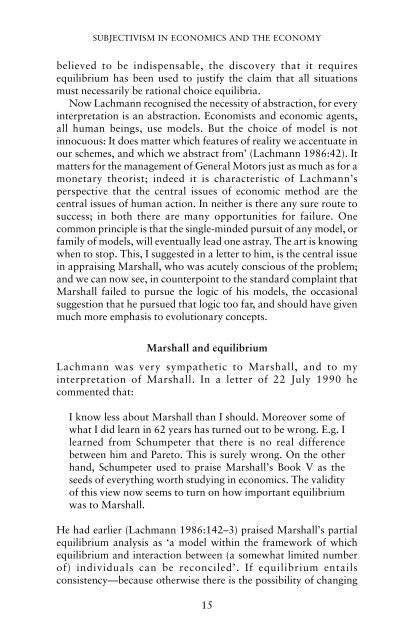Subjectivism and Economic Analysis: Essays in memory of Ludwig ...
Subjectivism and Economic Analysis: Essays in memory of Ludwig ...
Subjectivism and Economic Analysis: Essays in memory of Ludwig ...
Create successful ePaper yourself
Turn your PDF publications into a flip-book with our unique Google optimized e-Paper software.
SUBJECTIVISM IN ECONOMICS AND THE ECONOMYbelieved to be <strong>in</strong>dispensable, the discovery that it requiresequilibrium has been used to justify the claim that all situationsmust necessarily be rational choice equilibria.Now Lachmann recognised the necessity <strong>of</strong> abstraction, for every<strong>in</strong>terpretation is an abstraction. Economists <strong>and</strong> economic agents,all human be<strong>in</strong>gs, use models. But the choice <strong>of</strong> model is not<strong>in</strong>nocuous: It does matter which features <strong>of</strong> reality we accentuate <strong>in</strong>our schemes, <strong>and</strong> which we abstract from’ (Lachmann 1986:42). Itmatters for the management <strong>of</strong> General Motors just as much as for amonetary theorist; <strong>in</strong>deed it is characteristic <strong>of</strong> Lachmann’sperspective that the central issues <strong>of</strong> economic method are thecentral issues <strong>of</strong> human action. In neither is there any sure route tosuccess; <strong>in</strong> both there are many opportunities for failure. Onecommon pr<strong>in</strong>ciple is that the s<strong>in</strong>gle-m<strong>in</strong>ded pursuit <strong>of</strong> any model, orfamily <strong>of</strong> models, will eventually lead one astray. The art is know<strong>in</strong>gwhen to stop. This, I suggested <strong>in</strong> a letter to him, is the central issue<strong>in</strong> apprais<strong>in</strong>g Marshall, who was acutely conscious <strong>of</strong> the problem;<strong>and</strong> we can now see, <strong>in</strong> counterpo<strong>in</strong>t to the st<strong>and</strong>ard compla<strong>in</strong>t thatMarshall failed to pursue the logic <strong>of</strong> his models, the occasionalsuggestion that he pursued that logic too far, <strong>and</strong> should have givenmuch more emphasis to evolutionary concepts.Marshall <strong>and</strong> equilibriumLachmann was very sympathetic to Marshall, <strong>and</strong> to my<strong>in</strong>terpretation <strong>of</strong> Marshall. In a letter <strong>of</strong> 22 July 1990 hecommented that:I know less about Marshall than I should. Moreover some <strong>of</strong>what I did learn <strong>in</strong> 62 years has turned out to be wrong. E.g. Ilearned from Schumpeter that there is no real differencebetween him <strong>and</strong> Pareto. This is surely wrong. On the otherh<strong>and</strong>, Schumpeter used to praise Marshall’s Book V as theseeds <strong>of</strong> everyth<strong>in</strong>g worth study<strong>in</strong>g <strong>in</strong> economics. The validity<strong>of</strong> this view now seems to turn on how important equilibriumwas to Marshall.He had earlier (Lachmann 1986:142–3) praised Marshall’s partialequilibrium analysis as ‘a model with<strong>in</strong> the framework <strong>of</strong> whichequilibrium <strong>and</strong> <strong>in</strong>teraction between (a somewhat limited number<strong>of</strong>) <strong>in</strong>dividuals can be reconciled’. If equilibrium entailsconsistency—because otherwise there is the possibility <strong>of</strong> chang<strong>in</strong>g15

















